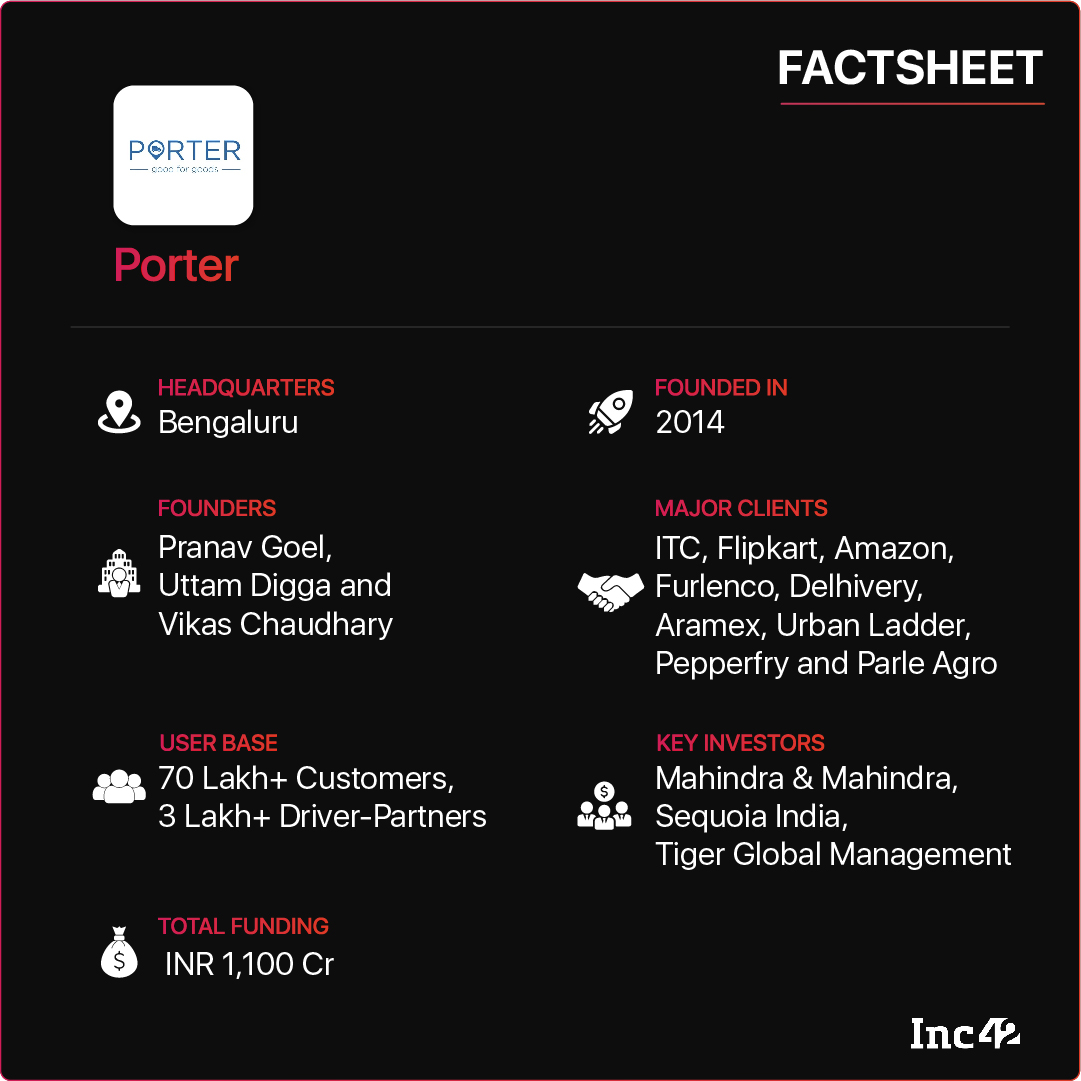Set up in 2014, Porter seeks to eliminate logistics bottlenecks with its on-demand online marketplace for intracity logistics
Porter currently operates in 15 cities and claims to have more than 3 Lakh driver-partners
Its enterprise customers include big players in the retail space such as ITC, Flipkart, Amazon, Furlenco, Delhivery, Aramex, Urban Ladder, Pepperfry and Parle Agro
Inc42 & WebEngage present, the second edition of “Decoding Hypergrowth”, a series capturing stories of successful businesses, the importance of intelligent engagement and their approach to creating the same.
An efficient logistics system is a critical component of a sophisticated supply chain, helping businesses with inbound and outbound transportation, materials handling, warehousing, order fulfilment and much more. Overall, the industry has emerged as a healthy indicator of economic growth because of its core expertise and ability to generate employment opportunities across all its sub-sectors — employing over 31 Mn people by 2022. According to Statista, the market is estimated to reach $380 Bn by 2025, growing at CAGR between 10-12%.
The logistics function has become all the more important for business success in the wake of the pandemic as people now prefer online shopping and doorstep deliveries. But the road to seamless mobility is often bumpy. A recent A&M report suggests that a high level of waste, losses due to transit damages and limited technology adoption pose significant threats to the industry’s potential. As for small and medium enterprises (SMEs) with little or no expertise in this space, running these operations on their own or seeking the assistance of a random service provider may make things even more complicated, given these challenges.
Such a scenario has opened the doors for tech-powered new-age players, keen to address the underlying issues efficiently and cost-effectively. But it was also the story of three IIT alumni — Pranav Goel, Uttam Digga and Vikas Chaudhary — when they researched the nitty-gritty of the logistics ecosystem eight years ago. The trio found a massive mismatch between the demand and supply of last-mile deliveries and wondered if technology and a disruptive business model could bridge the gap.
At the time, most businesses did their logistics in-house, but the infrastructure was far from adequate.
“Our founders noticed that two-three drivers worked with an SME, but most companies did not have regular requirements. On the other hand, a driver-partner could not work for more than three or four SMEs due to the contractual nature of the job,” explained Vijay Vinayan, general manager, retention and experience, at Porter. This also meant drivers had little monetary gains from these assignments, and customers often complained of poor visibility of supply and the lack of transparency and communication.
While doing their industry research, the trio was inspired by Uber’s success story and how the ride-hailing giant had transformed the taxi business, again an unorganised sector in many countries. They were also aware of the logistics roadblocks such as driver shortage and low vehicle utilisation. The aim was to develop a model for optimising capacity, reducing road freight costs and ensuring a steady flow of work for logistics partners (drivers, in this case). Finally, Porter emerged as an on-demand online marketplace for intra city logistics.
Playing The Matchmaker
Bengaluru-based Porter has developed an end-to-end automated tech stack to do away with the inefficiencies of traditional logistics. It caters to B2B and B2C segments, and vehicles can be booked on the platform to deliver commercial goods and household items to businesses, wholesalers, retailers/shop owners and individual customers. Once the booking is done, one can add multiple stops to the delivery journey as per requirements, track vehicle movement in real time and pay online via the UPI, net banking, debit and credit cards and e-wallets.
The startup claims that its driver-partners have seen a 30% rise in their income as it has created a visible demand-supply network to connect them to a steady stream of rides. “Customers, too, see price reduction when they use our platform. Porter does it through transparent pricing and route optimisation that ensure cost efficiency,” said Vinayan.
In addition, it has developed the Porter Delivery Partner app, which is available in English, Hindi, Tamil and Telugu for deeper market penetration and easy access. Registering on the platform is hassle-free as well. Once the app verifies their documents like driving licences and Aadhaar cards, driver-partners are ready for their first trip. Plus, they can list their LCVs (light commercial vehicles like tempos) with Porter via the app. The company has also added two-wheeler services (comes under the tempo category) to enable on-time last-mile deliveries.
Backed by marquee investors such as Sequoia India, Tiger Global Management, Vitruvian Partners, Mahindra & Mahindra and many others, Porter currently operates in 15 cities, including Mumbai, Delhi-NCR, Bengaluru, Jaipur, Nagpur and Indore. It claims to have onboarded more than 3 Lakh driver-partners and worked with over 70 Lakh customers since its inception. Its B2B customers include ecommerce behemoths such as Flipkart and Amazon, FMCG market leaders ITC and Parle Agro, new-age businesses such as Pepperfry and Urban Ladder and cargo/courier companies like Aramex and Delhivery, besides swathes of SMEs.
Due to network effects, the company is now scaling faster and recently raised INR 750 Cr in a Series E round. Vinayan said that the funds would be utilised to grow its team and expand its operations to enter the top 35 Indian cities by 2023. Although Porter did not disclose its revenue details, media reports pegged it to triple-digit annual growth throughout its journey.

Of Covid-Induced Growth And Customer Engagement
The Great Lockdown, induced by the pandemic, almost brought down the Indian economy, and road transportation came to a near halt. Porter carefully monitored its impact on the industry while spiralling Covid-19 cases pushed people into an unprecedented situation. All of a sudden, there was a huge demand for home delivery as people needed meals, medicines, Covid essentials and everything in-between. This led to the rise of intracity logistics, and last-mile delivery companies like Swiggy Genie and Dunzo, both based out of Bengaluru, becoming household names.
Watch Vinayan talk about Porter’s growth, the challenges it faced, its plans to move forward and more.
While acknowledging the downturn triggered by the health crisis, Vinayan also pointed out the other side of the story. “The logistics industry, especially the last-mile delivery segment, grew significantly (due to need-based requirements), and the industry opened up to doorstep delivery that promoted expansion.”
Porter aggressively scaled its two-wheeler service to meet the fast-rising demand-supply gap. Besides catering to individual customers (B2C), it also forayed into house shifting to help people with packing and moving as local service providers were rarely available during lockdowns.
“These service additions, along with the change in consumer behaviour (people would stick to home delivery for safety and convenience), increased our customer retention rate and led to a hike in our TPC, or trip per customer,” said Vinayan. Today, the packers and movers business accounts for nearly 5% of the startup’s total revenue.
The company had to deal with other issues long before the pandemic broke out. Critical business functions like onboarding new customers and retaining them through active user engagement are a challenge for most startups, and Porter is no exception. Tech-based logistics was a nascent segment when it started operations, leading to acceptance issues. Later on, there was intense competition as companies like Bengaluru-based LetsTransport and Blowhorn provided similar services across many big cities and towns.
In 2018, Porter partnered with WebEngage, a Mumbai-based new-age Retention Operation System that allows marketers to store user data and gain actionable insights. It further allows brands to orchestrate omnichannel campaigns by leveraging these insights and create a hyper-personalised end-user experience.
“WebEngage allowed us to execute multiple custom campaigns in a seamless manner. It also provided real-time analytics that helped formulate our marketing strategies and reach out to customers more effectively,” said Vinayan.
Porter also leveraged the Mumbai firm’s API integration to send personalised coupons to various customer segments with minimal manual intervention. This helped reduce manual data updation and other non-automated workloads by 80% and made coupon dispersal easier than before, said Vinayan. Using WebEngage’s user engagement and retention solutions, Porter witnessed a 20% increase in customer retention compared to the pre-pandemic level.
Digitalising Logistics Is The Need Of The Hour
As digitalisation redefines life, work and businesses in a post-pandemic world, startups like Porter are reshaping the traditional logistics market, dominated by 80% of unorganised players.
Porter’s growth in recent years has helped it scale from intracity to intercity logistics. It now claims to cover all neighbouring locations within the 200-300 km range of the 15 cities where it is already operational. It will grow two key areas – customer base and service offerings – and aims to add multiple commercial and rental vehicle options.
“Right now, we are primarily catering to small businesses and, to some extent, individual customers. We are trying to identify new use cases to expand our customer base,” said Vinayan.
Such initiatives will get a boost as the government has recently announced its plans to digitalise the logistics infrastructure through the PM Gati Shakti National Master Plan, a digital platform to bring railways and roadways together. As a result, tech-based logistics firms like Porter and its ilk can significantly improve the country’s supply-chain efficiency and logistical performance in the coming years, prepping organised logistics to reach a whopping $50 Bn market opportunity by 2025.









